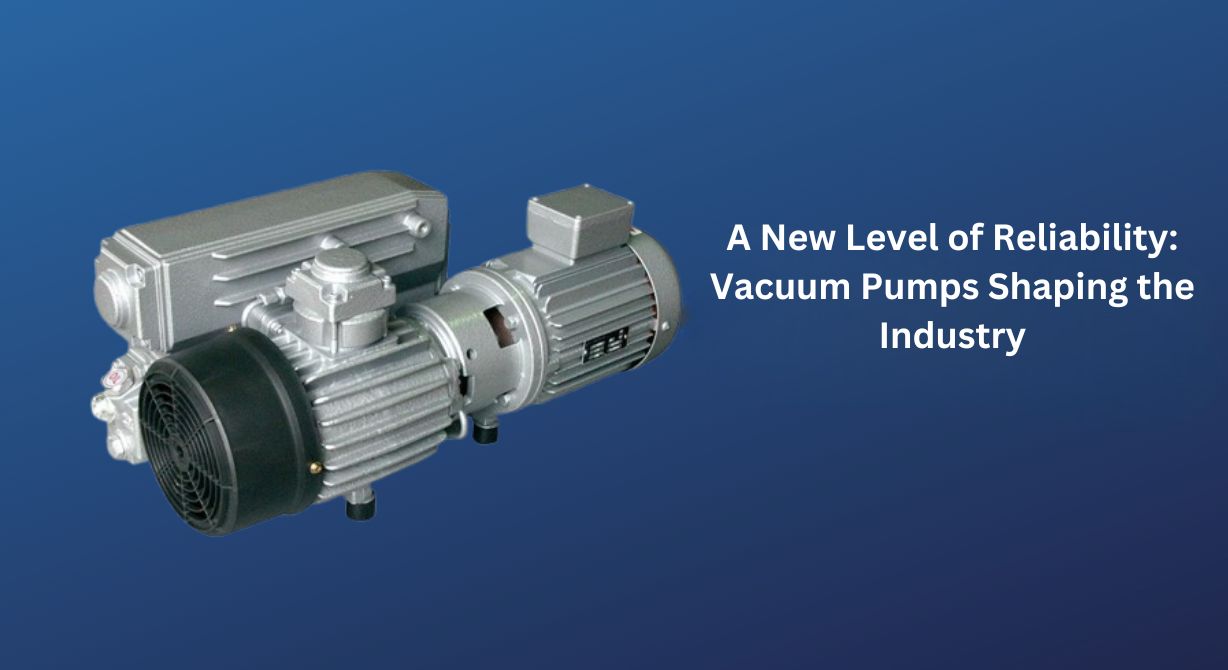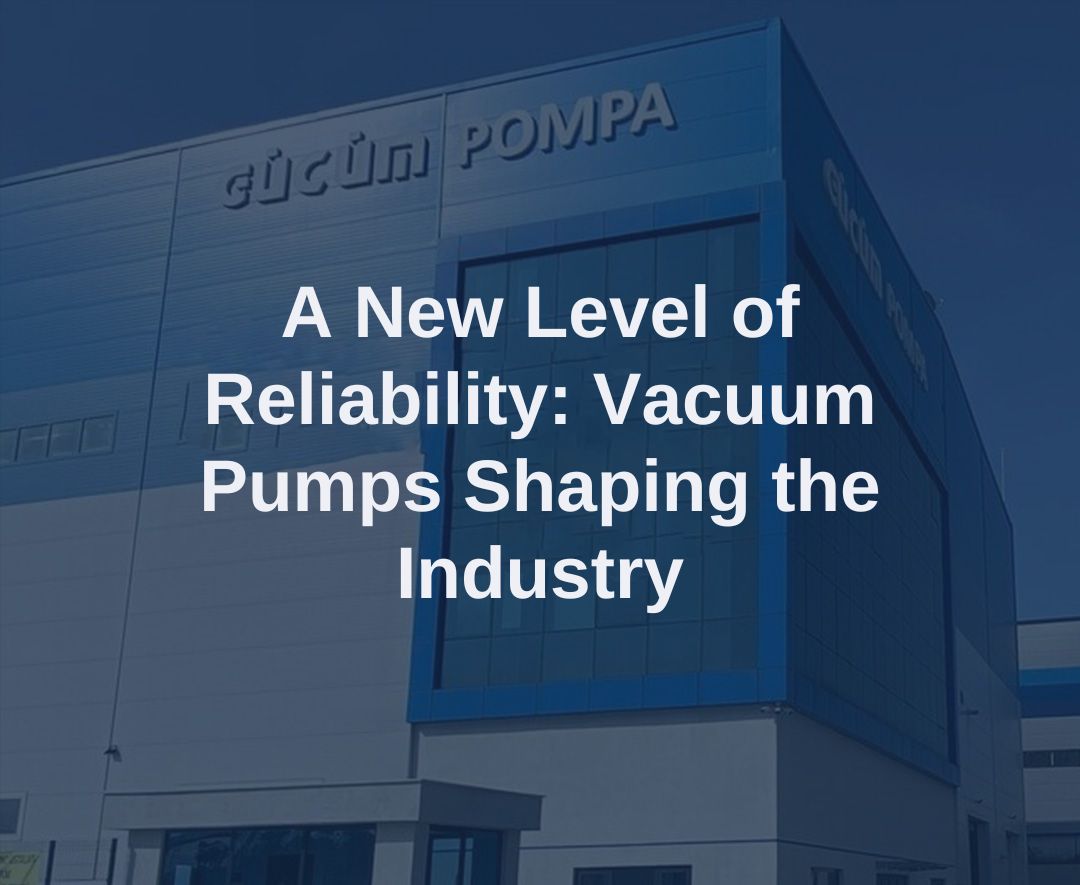A New Level of Reliability: Vacuum Pumps Shaping the Industry
Table of Contents
- How Is Reliability Measured in Vacuum Pumps? What Are the New Industry Standards?
- Why Do Next-Generation Vacuum Pumps Make a Difference in Reliability?
- Which Technologies Shape the Industry and Increase Reliability in Vacuum Pumps?
- New Levels of Reliability in Vacuum Pumps in 2025
- Vacuum Pumps Trusted by the Industry: Future Trends and Innovations
- Vacuum Pumps with Increased Reliability Thanks to Smart Technologies
How Is Reliability Measured in Vacuum Pumps? What Are the New Industry Standards?
Reliability measurement in vacuum pumps covers much more than just the technical performance of the pump. In the industry, reliability means continuous, fault-free, and efficient operation of the equipment. Therefore, new standards in the sector have expanded to include not only durability but also energy savings, ease of maintenance, and long lifespan.
Traditionally, vacuum pump reliability was evaluated based on Mean Time Between Failures (MTBF). However, today, with the integration of IoT and sensor technologies, real-time performance monitoring and proactive maintenance have become standard. This allows predicting failures beforehand and minimizing production interruptions.
The new standards also focus on environmental durability of pump materials, vibration, and noise levels. High vibration can cause mechanical wear and early failures, while quiet operation increases operator comfort in industrial environments. These factors are now critical and no longer ignored in vacuum pump selection.
Leading organizations in the industry base their work on international standards like ISO 21501, making vacuum pump performance and reliability tests more comprehensive. These standards force pump manufacturers to meet specific criteria for both efficiency and durability.
In conclusion, vacuum pump reliability is now measured not only by failure rates or operating hours but also by smart monitoring systems, energy efficiency, material quality, and environmental impact. This continuously raises the bar for vacuum pump reliability in the sector.
Why Do Next-Generation Vacuum Pumps Make a Difference in Reliability?
Next-generation vacuum pumps create a significant difference in reliability compared to traditional models. At the core of this difference lies advanced technology integration and smart systems. Pumps are no longer just mechanical devices but complex equipment equipped with IoT-supported and sensor-based monitoring systems.
Thanks to these developments, pump performance can be tracked in real time, allowing intervention before potential failures arise. Thus, unexpected shutdowns and costly repairs are minimized. Additionally, energy efficiency improves while the lifespan of devices significantly extends.
The material quality and design innovations used in next-gen vacuum pumps are other important factors boosting reliability. Reduced friction, improved cooling systems, and optimized parts help pumps wear less and operate more stably, directly impacting operational reliability.
Moreover, modular structure and easy maintenance options allow quick intervention in case of failures. This ensures uninterrupted production processes and increases user satisfaction.
In short, the innovations in reliability offered by next-generation vacuum pumps are among the main reasons for their preference in the industry.
Which Technologies Shape the Industry and Increase Reliability in Vacuum Pumps?
Technologies that increase reliability in vacuum pumps continuously evolve to meet the rapidly changing needs of the industry. First of all, vacuum pumps equipped with IoT integration can constantly monitor device status by collecting and analyzing real-time data. This enables detecting potential failures before they emerge, optimizing maintenance schedules.
Another critical technology is smart sensors. These sensors continuously measure parameters like pressure, temperature, and vibration, keeping pump performance at the highest level. When combined with early warning systems, this minimizes failure risk.
Material quality and design of vacuum pumps also play a significant role in reliability. Advanced composite and alloy materials increase durability, reduce friction, provide energy savings, and extend device lifespan.
Additionally, modular structure and easy maintenance systems enable operators to control devices faster and more effectively, allowing uninterrupted production and long-term reliability.
Finally, energy efficiency technologies support both environmental sustainability and the stable, reliable operation of vacuum pumps.

New Levels of Reliability in Vacuum Pumps in 2025
By 2025, the concept of vacuum pump reliability gains a completely new dimension. Increasing industry demands, longer operating times, and minimized maintenance intervals require advanced technological solutions to emerge. In this context, smart sensors and IoT-supported monitoring systems enable real-time performance tracking of vacuum pumps. This allows early detection and prevention of potential failures.
Unlike traditional pumps, new generation designs increase both energy efficiency and reduce mechanical wear thanks to low-friction technologies and advanced material use. This significantly reduces maintenance costs over the long term.
Modular structures and easy part replacement simplify operators' jobs and shorten intervention times for vacuum pump failures. Thus, production downtime is minimized.
Furthermore, AI-supported maintenance algorithms analyze pump performance data and offer optimized maintenance schedules. These systems not only foresee problems but also determine the best maintenance strategies according to operating conditions.
Lastly, the widespread use of eco-friendly and sustainable materials enhances reliability and minimizes environmental impact. Therefore, in 2025, vacuum pump reliability becomes the key to production efficiency and sustainability.
Vacuum Pumps Trusted by the Industry: Future Trends and Innovations
The vacuum pump industry is undergoing rapid evolution in reliability and performance. Thanks to Industry 4.0 and IoT technologies, vacuum pumps are no longer just mechanical devices but are transforming into smart systems. These innovations make pump operations more predictable, efficient, and cost-effective.
One of the emerging trends in 2025 is remote monitoring and control systems. This allows businesses to track vacuum pump status in real time and intervene early in case of potential failures. As a result, maintenance costs decrease and production interruptions are minimized.
Energy savings and sustainable designs have also become trends in the industry. Low-friction parts and eco-friendly materials used in next-gen vacuum pumps increase energy efficiency and reduce carbon footprint.
Meanwhile, modular structures and easy maintenance features shorten service times and reduce failure-related downtime. This provides significant time and cost advantages for businesses.
The latest sensors and AI algorithms continuously optimize vacuum pump performance, raising industry standards. Thus, reliability and innovation progress hand in hand in the sector.
Vacuum Pumps with Increased Reliability Thanks to Smart Technologies
Reliability in vacuum pumps is critical for uninterrupted industrial processes. Today, thanks to smart technologies, the reliability of vacuum pumps has significantly increased. These technologies allow real-time monitoring of device performance and early detection of possible problems.
IoT-supported sensors continuously measure important parameters such as temperature, pressure, and vibration of vacuum pumps. The collected data is analyzed by advanced analytics systems, which predict maintenance timing or risk of failure. This minimizes unplanned downtime and ensures production line continuity.
Additionally, automatic adjustment and control mechanisms optimize pump performance by reducing energy consumption and limiting wear. This lowers costs and extends pump lifespan. These features have become indispensable for increasing operational efficiency in industrial facilities.
AI-supported maintenance systems analyze failure patterns with learning algorithms and predict potential future problems. This makes maintenance more proactive and targeted, preventing unnecessary costs.
All these advancements not only increase reliability in vacuum pumps but also strengthen the competitive advantage of businesses.


